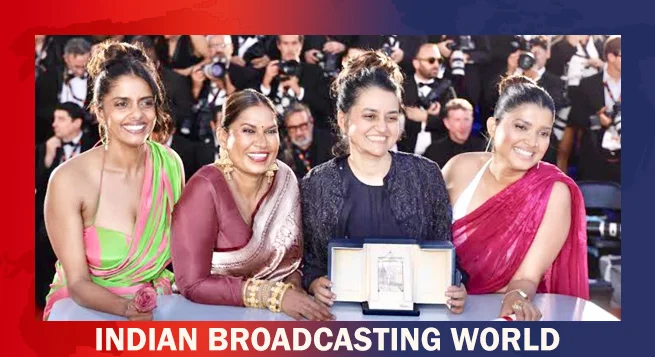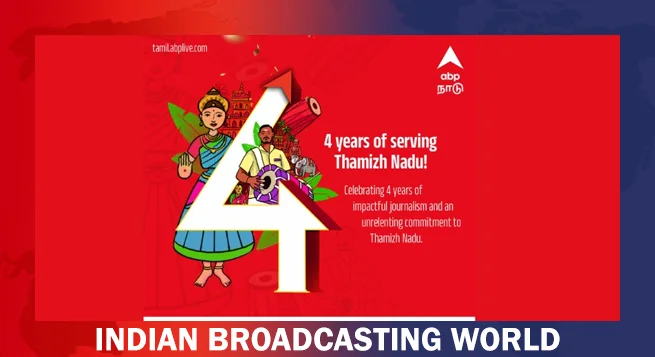It was a triple feat for Indian talent at the 2024 Cannes Film Festival with Payal Kapadia’s ‘All We Imagine As Light’, “Sunflowers Were the First Ones to Know’ by FTII student Chidananda S Naik and Anasuya Sengupta of ‘The Shameless’ fame winning major awards in each of the three competitive sections of the prestigious gala.
The 77th edition of Cannes, which concluded on Saturday, was undoubtedly the best year for the country which found space at the fest through eight Indian, or India-themed, films, a PTI report from Cannes said yesterday.
Other agency reports stated that congratulatory messages poured in for the three winners, including those from PM Narendra Modi, West Bengal CM Mamata Bennerjee, Kerala CM Minister Pinarayi Vijayan, Congress’ Rahul Gandhi and film institute FTII in Pune.
Kapadia, an alumna of the Film & Television Institute of India (FTII), charted history by becoming the first Indian filmmaker to win the Grand Prix award for ‘All We Imagine as Light’ (in the picture).
“Thank you, Cannes Film Festival for having our film here. Please don’t wait 30 years to have another Indian film,” she said in her speech. The movie earned the honour, the second-most prestigious prize of the gala after the Palme d’Or, which went to American director Sean Baker for ‘Anora’.
‘All We Imagine As Light’, a Malayalam-Hindi feature starring Kani Kusruti, Divya Prabha and Chhaya Kadam, revolves around three women in Mumbai who go on a road trip to a beach town.
Kapadia’s movie, her feature directorial debut, is the first Indian film in 30 years and first ever by an Indian female director to be showcased in main competition, last being Shaji N Karun’s ‘Swaham’ (1994).
That ‘All We Imagine As Light’ will win an award became almost certain when it received glowing reviews following its premiere, with some international critics describing it as a “portrait of urban connection” and “poetic meditation” as well as comparing Kapadia’s work to that of masters like Satyajit Ray and Wong Kar Wai.
Though the second most prestigious prize at Cannes, Grand Prix has a storied history with prominent titles including this year’s Oscar winner ‘The Zone of Interest’ and Park Chan-wook’s revenge drama ‘Oldboy’ as part of the list.
‘All We Imagine as Light’ has already found distributors for its North America release, but it’s unclear when the film will be screened in India.
Prime Minister Narendra Modi said India is “proud” of Kapadia for her historic feat. “Bharat’s creative economy” is indeed shining with three films winning awards this year at Cannes.
“I am proud to share that this film is also the official co-production of the I&B Ministry and is supported by its Film Incentive Scheme,” said Information and Broadcasting Minister Anurag Thakur about ‘All We Imagine As Light’.
Kapadia, who led a student protest against the appointment of actor-politician Gajendra Chauhan as FTII chairman, had won the Oeil d’or (Golden Eye) award at Cannes for acclaimed documentary ‘A Night of Knowing Nothing’ which premiered under Director’s Fortnight section in 2021.
That’s not all. Production designer Sengupta, who starred in a key featuring role in Bulgarian director Konstantin Bojanov’s ‘The Shameless’, became the first Indian to win the best actress prize in Un Certain Regard.
‘The Shameless’ explores a dark world of exploitation and misery in which two sex workers forge a bond. Sengupta dedicated her win “to the queer community and other marginalised communities”.
Neeraj Ghaywan’s ‘Masaan’ previously won two awards—FIPRESCI, International Jury of Film Critics prize and Promising Future prize in the section.
Naik’s ‘Sunflowers Were the First Ones to Know…’, which won the La Cinef first prize (film school fiction or animated films), was another feather in FTII’s cap.
Based on a Kannada folktale, the movie follows an old woman who steals a rooster following which the sun stops rising in the village. The third La Cinef prize went to India-born Mansi Maheshwari’s animation film ‘Bunnyhood’.
Previously, Indian films to be selected for the Cannes Competition segment include Mrinal Sen’s ‘Kharij’ (1983), M S Sathyu’s ‘Garm Hava’ (1974), Satyajit Ray’s ‘Parash Pathar(1958), Raj Kapoor’s ‘Awaara’ (1953), V Shantaram’s ‘Amar Bhoopali’ (1952) and Chetan Anand’s ‘Neecha Nagar’ (1946).
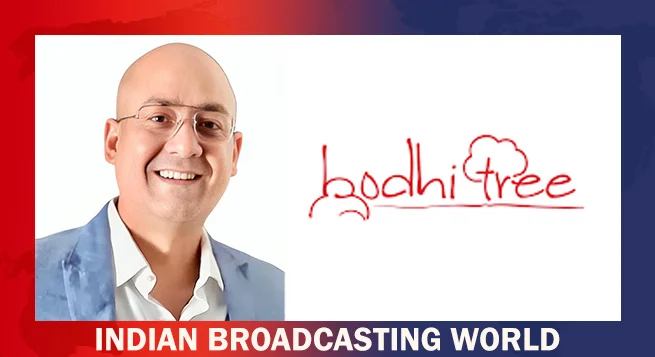 Bodhitree appoints Sudip Roy CRO; launches new revenue division
Bodhitree appoints Sudip Roy CRO; launches new revenue division 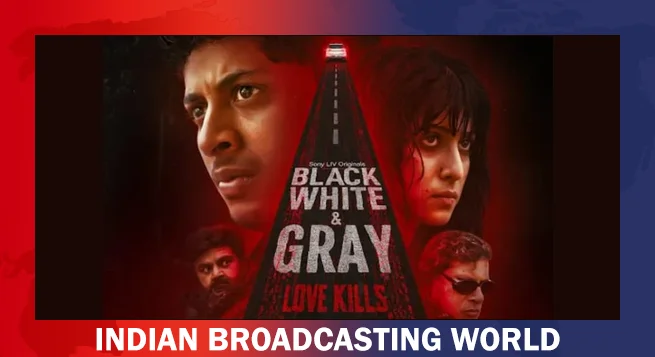 SonyLIV drops ‘Black, White & Gray-Love Kills’ trailer
SonyLIV drops ‘Black, White & Gray-Love Kills’ trailer  Rahul Sinha takes charge of Zee News’ DNA
Rahul Sinha takes charge of Zee News’ DNA 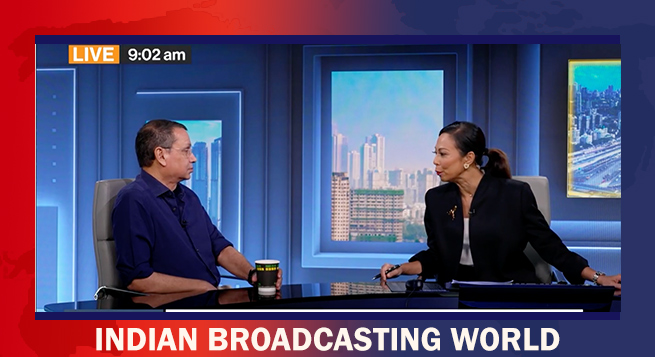 JioStar vice-chair Uday Shankar on surge in streaming subs, trade tariff challenges
JioStar vice-chair Uday Shankar on surge in streaming subs, trade tariff challenges  ‘The Legend of Hanuman’ S6 debuts at #1 on Ormax’s streaming Top 10
‘The Legend of Hanuman’ S6 debuts at #1 on Ormax’s streaming Top 10  Nand Kumar Nair joins TV9 Network as editor
Nand Kumar Nair joins TV9 Network as editor  CTV is new primetime: How IPL ‘25 redefined brand recall in living rooms
CTV is new primetime: How IPL ‘25 redefined brand recall in living rooms  Netflix drops stylish trailer of heist drama ‘Jewel Thief…’
Netflix drops stylish trailer of heist drama ‘Jewel Thief…’ 


